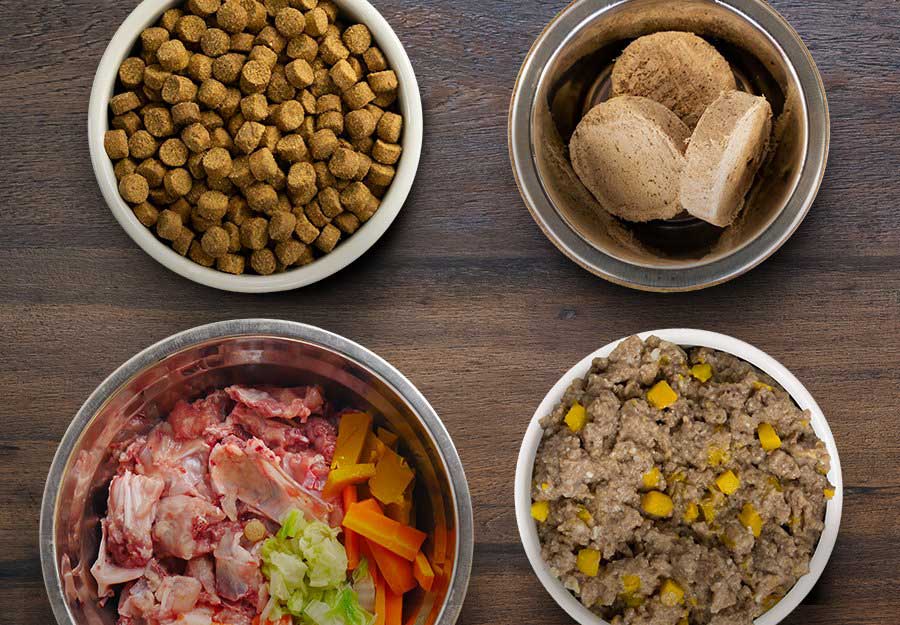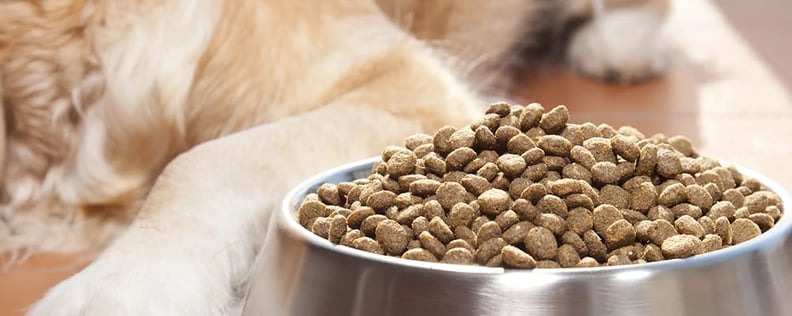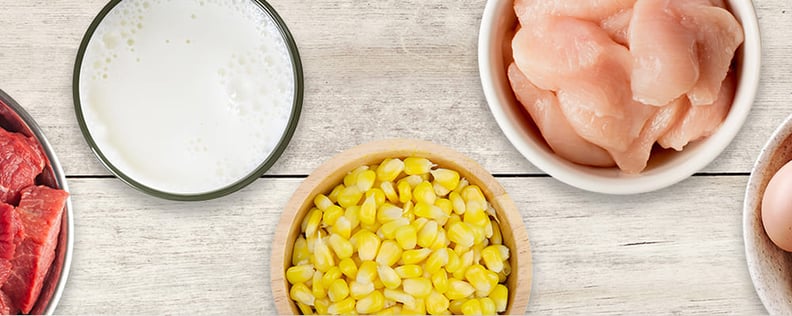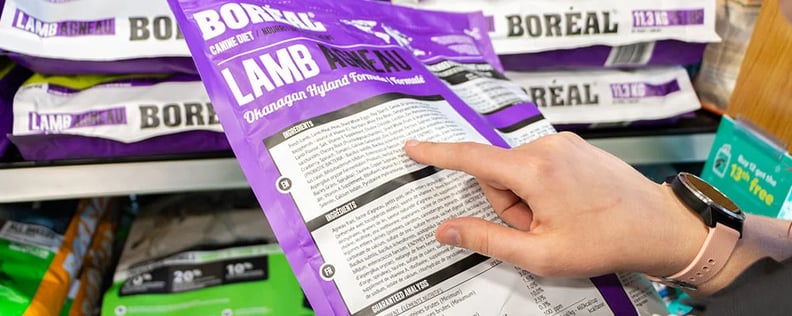
When you walk into your local pet store, you will find yourself standing in front of a great wall of dog food, thinking - what kind of food should I feed my dog? Find out the basics of dog nutrition to help you select the most nutritious and beneficial dog food.
There are so many dog food options out there, and it can seem daunting to try to decide which food is going to be the right fit for your dog. Every pet is different, and their diet should reflect that.
We can help you determine what your dog needs are and how to find the food to help them thrive. With a complete and balanced diet, your dog can lead a long and happy life.
What Should I Feed My Dog?
Whether you are looking for the right diet for your new dog or you're wondering if the food you’re feeding your dog is providing appropriate nutrition, this guide will be a helpful tool to simplify the process of finding the right food for your dog, as well as the amount of food they require each day.
Whether you are looking for raw dog food, tasty dog kibble, or premium canned food for dogs, you will not find a shortage of options at Homes Alive Pets. Learn what your dog needs to thrive, how to analyze your dog's food, and how food can be used to treat common doggy issues.
After reading this guide, you will be able to:
-
- Understand the core concepts of canine nutrition and dietary requirements
- Recognize the tricks of pet food labelling and analyze pet foods based on the ingredients panel and packaging claims
- Determine which ingredients will enhance the quality of your dog’s health and which could degrade it
- Choose a dog food that will help manage your dog’s weight, build muscle, and even address the effect that diet can have on some common health concerns
- Understand the needs of your dog at each life stage, and allow them to develop and maintain optimal health
- Know the answer to - how much should I feed my dog?
Healthy Dog Food Creates Healthy Dogs
The quality of your dog’s food isn’t just about how good it tastes or how much it costs, though these aren't unimportant factors. When you wonder - What should I feed my dog, many factors need to be considered.
High-quality dog foods provide numerous health benefits to your dog and give you the peace of mind that you are providing your furry friend with appropriate and complete nutrition.
Here are a few examples of the benefits of choosing a better-quality diet for your dog:
- More energy and better metabolism
- Shinier and healthier skin and coat
- Better oral health
- Improved digestion
- Fewer vet visits
- Healthier weight and appropriate muscle development
- Less stool
Dog food is multifaceted, and understanding what to look for in food will ensure that your dog is healthy, happy, and active at every stage of life. After reading this guide, you can assess your pet’s diet and needs to determine if a diet change would be beneficial. What food should I feed my dog?
Dog Nutrition Basics

What do all dogs need?
Domesticated dogs have not veered too far from their ancestors. Although commercial pet foods have come a long way, the core concept remains: meat-rich, natural diets provide the energy and nutrients required for the growth and maintenance of your dog.
From raw diets to grain free, there are many options in terms of commercial dog food. As a pet owner, it is highly beneficial to do your research to find the best, non-toxic to dogs food
This chapter will discuss their basic needs as canines and give you a clearer understanding of what role proteins, fats, and carbohydrates play in their bodies.
Pet Food Labels
Avoiding clever marketing tricks
It’s too easy to be tricked by clever wordplay and marketing lingo, and pet food manufacturers are especially good at this. To truly understand what is in your dog’s food, you need to cut through the marketing haze and take a look at the fine details.
Understanding your pet's food label isn’t always cut and dry, but this chapter will help you understand what red flags to look for. Both the guaranteed analysis and the ingredient list offer more insight into your dog food’s quality than you think.
Learn how to avoid less desirable ingredients to improve your dog’s health and well-being.
What Does Your Dog Need?

What are your dog’s unique dietary needs?
Every dog is different, and their food needs to reflect that. Whether your dog is young or old, skinny or fat, there’s dog food for that with a complete and balanced ingredient composition.
Choosing a dog food guide isn’t as simple as just their weight and age. This chapter will dive into your dog’s breed and genetic predispositions, their activity level and stamina, and even their mental health.
Once you’ve looked at your dog’s current health and lifestyle as a whole, you will have a much better idea of how to choose the most appropriate dog food for them and what should be given only in a small amount.
A Puppy Food Breakdown

Caring for your dog’s development
Their formative years are the most impactful stage in your dog’s life. This stage can have lasting, if not life-long, effects on their health, so feeding them the right food will help them grow strong, healthy, and happy.
Learn what a puppy needs to properly develop their muscles, skeletal structure, and, most importantly, cognitive function. Foods that are suitable for puppies should be more abundant in a number of nutrients and should be able to provide the energy their bodies need to grow and develop.
This chapter will cover not only dietary requirements but also how to choose the right type of puppy food and analyze their current diet for effectiveness.
Managing Dog Food Allergies

Identify and Prevent Reactions
Allergies are a common ailment for dogs. Finding a diet that can stop the itching and scratching can be difficult. We don’t want to helplessly watch our pets suffer, so finding food that eliminates allergic reactions is important.
Even a small amount of foods like Macadamia nuts are toxic to dogs, so it is important to monitor any ingredients your dog will consume.
In this section, we will cover the symptoms of allergies and how to prevent them.
Discover the difference between food allergies and digestive sensitivities, as well as some helpful tips for reducing common reactions. Allergies don’t have to be a headache, and knowing what to look for and how to feed accordingly will improve your dog’s health dramatically.
Food for Fat Dogs

Curbing the Canine Obesity
Your dog’s metabolism may not be as efficient as it could be, and it’s probably because of their food. Diet needs to be balanced with activity, and how many calories are just as important as where those calories come from.
Canine obesity rates are getting out of hand, and their diets play a huge role in how their bodies use energy, burn fat, and build muscle. It has been proven that overweight dogs lead shorter and less healthy lives.
Take a hard look at your dog’s diet and habits to see if you need to make a change for the better. It's never too late to try and get your dogs to eat healthily.
Learn how a healthy diet and an active lifestyle can give your dog a new leash on life.
Food for Digestive Support

Poor digestion = poor health
You may not know how much your dog’s digestive system affects the rest of its body. It feeds nutrients and energy to every system. A compromised digestive system can lead to issues with stool quality, cause pain and discomfort, and even trigger skin reactions.
Unchecked digestive issues can worsen over time and potentially lead to lifelong complications, deficiencies, or diseases.
This chapter will provide you with the tools to improve your pet’s digestion through diet and help you identify foods that may be contributing to your dog’s tummy troubles.
Dog Food For Older Dogs

Preventative Care for Old Dogs
The last years of their life are the most delicate, and choosing a healthy diet can ward off some of the damaging effects of time. We want our older adult dogs to be happy and healthy for as long as possible, so feed them the best food to give them the best life.
This final chapter will help you vitalize your senior pet by improving their digestion, weight, appetite, and activity levels. Learn how to identify senior symptoms and when to start making adjustments to support your aging pet.
Additional Resources:
Types of Dog Food: A Helpful Breakdown
What’s in the food is very important, but the format of the food can change how well the diet suits your dog. Learn the different types of dog food available, and decide which one will help your dog thrive.
How Much Should I Feed My Dog?
Feeding guidelines can be inaccurate. Our handy calorie calculator tool will show you how many calories your dog needs to stay fit and active at each stage of life. How you feed can impact their weight, muscle, and digestion, and this article will help you determine if you are feeding your pet right.
Trial and Error
Dog food is often marketed as a one-size-fits-all solution to your pet's health issues, but the fact is, every dog is unique, and not every diet will be right for every dog. Choosing the best dog food sometimes requires some trial and error.
Make sure to monitor your dog's digestion, weight, energy levels, and their skin and coat to determine if the food you chose is keeping them healthy. After 6-8 weeks of a new dog diet, if you are not satisfied with the results, it might be time to try something new.
Make sure you know how to transition your dog's food safely to prevent digestive issues. Changing dog food too much or too fast can contribute to poor digestion and make it very challenging to find the right food.
Frequently Asked Questions About Dog Food
What kind of food should I feed my dog?
When choosing dog food, it's important to consider factors such as your dog's age, breed, size, specific dietary needs, and any health concerns they may have. Consulting with your veterinarian can help determine the best type of food, whether it's dry kibble, wet/canned food, raw, or dehydrated food, to meet your dog's nutritional requirements.
What factors should I consider when deciding what to feed my dog?
When determining what to feed your dog, consider their age, breed, size, activity level, and any specific dietary needs or health concerns they may have. It's also important to choose a high-quality dog food that provides balanced nutrition.
What are the main types of dog food available?
There are several main types of dog food: dry kibble, wet or canned food, raw food, and dehydrated food. Each type has its own advantages and considerations. Dry kibble is convenient and helps promote dental health, while wet food can be more palatable and provide additional hydration. Raw and dehydrated foods are less processed and may contain whole, natural ingredients.
How do I choose a high-quality dog food brand?
Look for dog foods that have high-quality protein sources as the main ingredient, such as meat or fish. Avoid foods with excessive fillers, artificial preservatives, and by-products. Checking for a statement from the Association of American Feed Control Officials (AAFCO) on the packaging can also indicate that the food meets nutritional standards.
Should I consult with a veterinarian about my dog's diet?
Yes, consulting with a veterinarian is highly recommended when determining the best diet for your dog. They can assess your dog's specific needs, guide appropriate portion sizes, recommend specific brands or formulations, and address any concerns or dietary restrictions your dog may have. A veterinarian's expertise ensures that your dog's nutritional requirements are met for their overall health and well-being.
.png?width=200&height=66&name=logo%20(1).png)











.jpg)
